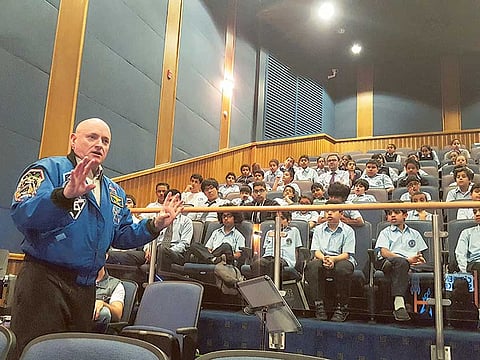Platform to promote science learning unveiled
Platform will allow smartphone to be used for scientific data gathering and sharing, and engage children in learning

Abu Dhabi: A mobile platform that will soon allow children to collect data for scientific purposes and participate in science-based challenges was launched in the capital on Monday.
The platform, Citizen Science, is being developed by digital platform developer Tribal Planet, in collaboration with multinational professional services firm, Ernst & Young, and is supported by education sector regulator Abu Dhabi Education Council (Adec). It is expected to be launched later this year.
“If the platform is beneficial for our pupils and creates an interest in science, technology, engineering and maths (STEM) learning, we will be very keen to integrate it into our curriculum,” said Dr Yousuf Sheriyani, adviser to the Adec’s director general. He was speaking on the sidelines of a press conference that saw the platform developers unveil the concept of Citizen Science to pupils, teachers and potential investors.
According to its makers, Citizen Science harnesses many of a smartphone’s inbuilt sensors to perform scientific experiments or collect data.
“For example, a phone’s luminometer, which detects the amount of light, can be used to measure the level of light pollution. Similarly, its thermometer can be accessed through the platform to measure ambient temperature. We can also integrate add-ons that allow a phone to measure other variables or take macro pictures. This sort of data can then be relayed to scientists in order to collect reward points, or be part of a child’s own experimentation,” Mary Gifford, one of the science experts at Tribal Planet, told Gulf News.
Children who share such data with partner scientists and companies will gain points that they can redeem for various prizes. Developers believe they would be able to offer concert tickets and experiences.
In addition, information on how often and well children use Citizen Science could be made available to education authorities so that they could see the impact of the platform on promoting STEM learning.
“We believe that it could therefore be used to identify budding scientists early, and be instrumental in helping them develop their skills,” said Tareq Al Mourad, programmes and performance director at the Adec.
A pilot project was also undertaken with two Abu Dhabi public schools in March. As part of it, a group of boys visited the mangroves to measure water pH and temperature, while female pupils used the Citizen Science interface to perform velocity and acceleration experiments in the classroom.
“The platform helped us get more accurate readings, and since we tend to like using our smartphones so often, it made the lesson more engaging,” said Noura Yousuf, a Grade 10 pupil at Al Mawaheb School.
Sign up for the Daily Briefing
Get the latest news and updates straight to your inbox
![Sharjah to pilot UNESCO’s ECCE-PATT tool, highlighting its leadership in early learning systems. [Illustrative image]](http://media.assettype.com/gulfnews%2F2026-02-08%2F3mxn16n8%2Fchild.jpg?w=320&auto=format%2Ccompress&fit=max)
